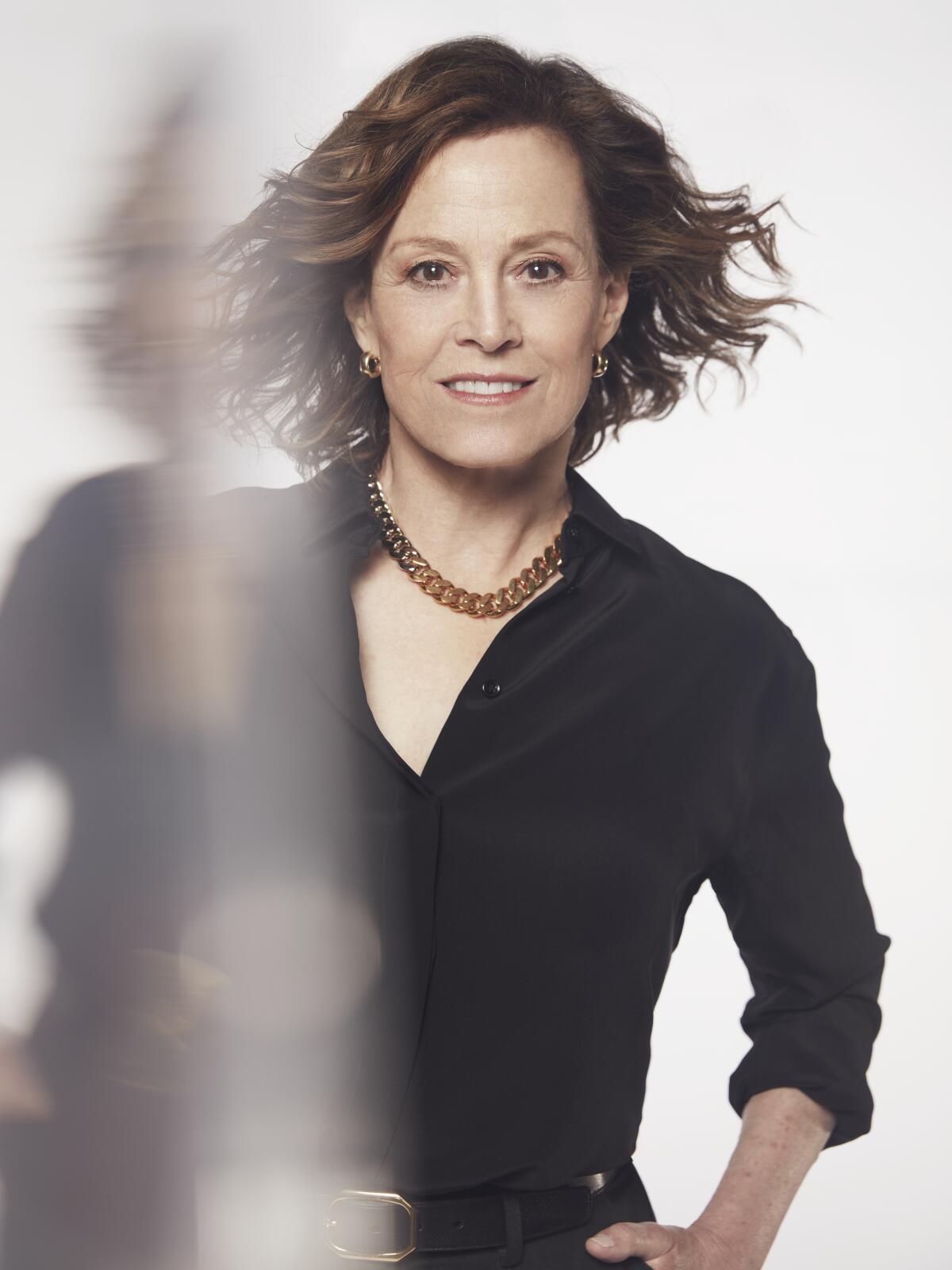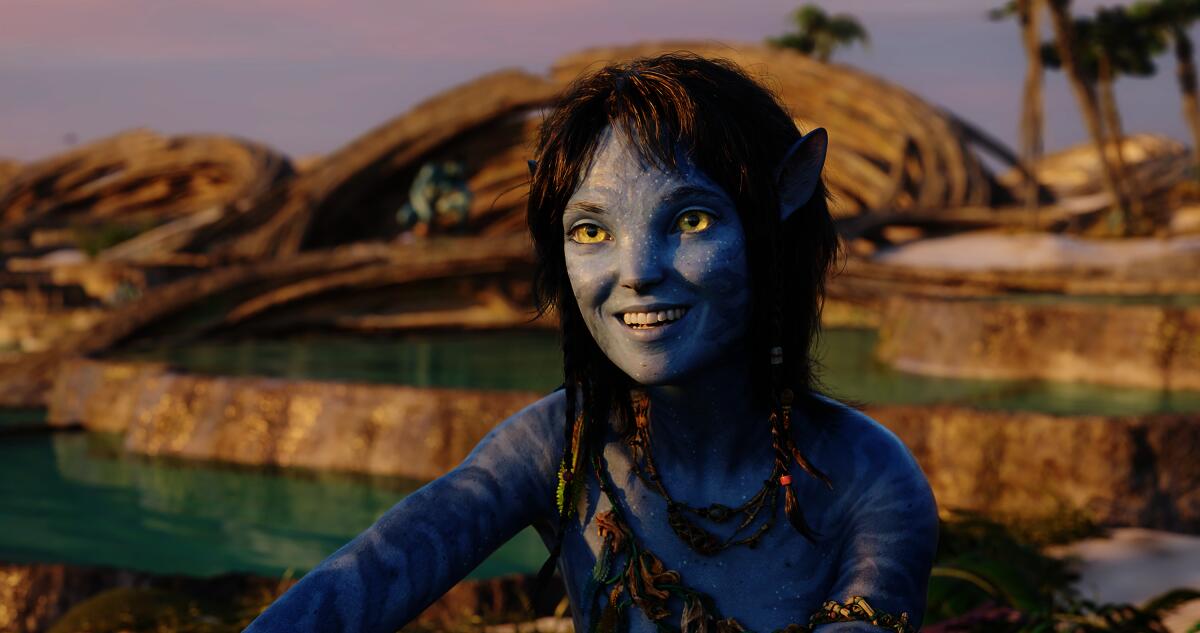How Sigourney Weaver brings out her inner teen in the new ‘Avatar’

- Share via
In the movies, Sigourney Weaver is in charge: She’s Ripley kicking xenomorph butt (“Alien” films); presaging the apocalypse via possession (“Ghostbusters”) or making abortions possible for women in the ‘60s (“Call Jane”). She’s the character who just gets stuff done. And that was true in 2009’s “Avatar,” where she played an exobiologist who created the Avatar program.
But for “Avatar: The Way of Water,” things are a bit flipped around: While Weaver appears briefly as Dr. Augustine, mostly she is a Na’vi-human named Kiri who has special abilities — but is also a teenager, with all that entails. The Envelope spoke with Weaver from her New York home about her legacy of memorable roles, (not) watching her pal Jamie Lee Curtis’ horror films, and director James Cameron, the mischief-maker.
You return in “Avatar 2” playing both a scientist and her teenage daughter. How did you get Kiri’s accent and voice just right?
I was lucky enough to be allowed by LaGuardia High School to sit in on a few classes of theater students, like from 12 to 15. It’s such an amazing age, because every kind of voice exists — ones that sound very young and ones that sound mature. It was hard for me [to be an adolescent] because I was so tall. People always expected me to be the adult in the room, which was unfortunately never true. But all this gave me permission to let Kiri come out.
“Avatar” is both science fiction and fantasy, and genre roles have really anchored your career — “Alien,” “Ghostbusters, “Galaxy Quest.” Are you a genre fan?
The little genre rooms, closed off to each other, is something I don’t see. I just see great stories. I don’t care where they’re from. This movie is, as Jim [Cameron] says, “What does it mean to be human?” I think these are good yarns. I’m in the good yarn business.

Your friend Jamie Lee Curtis also got her break in genre films — with her it was horror and “Halloween,” and I asked her a similar question.
When I look at Jamie Lee’s work, and she’s the heroine of this incredible series [“Halloween”] — which, frankly, I’ve been too afraid to watch — it’s put in this horror box. I’m not sure these genre labels are helpful in terms of movies these days. It’s adventure, you know?
What holds you back from watching her film? “Alien” is pretty scary too.
Those films to me are so real. I don’t want to see [Jamie] in that. As I said to my friend [“The Walking Dead” producer] Gale Anne Hurd, “I’d love to watch ‘The Walking Dead.’ Is there a version where you take out all the scary parts?” I am just not willing to pay the price. I’m a terrible coward.
Did breaking out as Ripley alter the roles you were offered? Like, did you have to push back at some point to say, “I’m more than a kick-ass alien killer?”
After “Alien,” I was sent a lot of humorless characters that said, “All right, people, let’s do this.” That’s never who Ripley was anyway. If you send me something that’s reminiscent of something I’ve just done, I go in the opposite direction.
You and James Cameron have worked together on multiple films, from “Aliens” to the “Avatar” movies. What is it about you two that clicks?
He’s much smarter than I am. He would be the whiz kid in every class. I adore his storytelling — it’s always about something much more than the people in it. He’s very daring. And underneath it all, we’re quite mischievous.
Like, pranks around the set kind of mischievous?
That would certainly be a possibility! He has a very lighthearted side. He’s a much more relaxed guy now. He’s very playful. We have a good time.
You come from a show business family — your mother acted, your father was a TV executive, and your uncle sang funny songs. Was it inevitable that you’d go into the business?
Not at all. I was very, very shy. I don’t think they had a clue what I would do; nor did I. The one time I called a friend of my father’s, who had a show on NBC … and the guy said, “Do yourself a favor, kid, get a job at Bloomingdale’s.” But then I went to [Yale University School of Drama] and that made my father happy, because I was treating acting seriously. I had freedom in the early days to do so much off-Broadway work without any scrutiny, and be very free. I have to credit that early work, where I was playing multiple schizophrenics and goodness knows what else, with giving me the freedom to understand how to develop Kiri.
These days, how do you decide what script or story you want to tackle next?
If it makes your heart start beating differently right away. It’s a physical experience for me, reading a story. I always try to read it from beginning to end in one sitting. I learned that by reading an interview with James Earl Jones. It’s a good idea — because then the story happens to you.
More to Read
From the Oscars to the Emmys.
Get the Envelope newsletter for exclusive awards season coverage, behind-the-scenes stories from the Envelope podcast and columnist Glenn Whipp’s must-read analysis.
You may occasionally receive promotional content from the Los Angeles Times.






